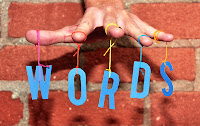Short words are best and the old words when short are best of all. ~Winston Churchill
Well I suppose Winnie should know, he wrote enough of them – words that is; and I’ve been writing a few over the weekend and have been struggling with some dialogue which isn’t going well.
“Oh hello,” he said as he opened the door “do come in”. “Thank you” she said as she entered. “And … how have you been?” he said, “Fine!” she said.
Well, I think you can see that it’s not what I would call inspired, and when you are describing dialogue you face a constant problem – how many ways can you indicate that someone has spoken? Winston claims that short words are best, and the shortest is the verb ‘to say’ – ‘I say’ ‘You say’; ‘he or she said.’
But you can see from the above example of my common place dialogue that it can get … er … monotonous – she said!
So in desperation I gave up on the writing and decided to explore the Thesaurus instead. There must be more words to indicate speech than just that one – and do you know there are over 200 that I have gathered; which could add considerable interest to my rather run of the mill dialogue.
While many of these words do have the same or similar meaning, it is important that we choose one that works in context. For instance I can ‘inform’ you of the facts, or I can ‘explain’ the facts – the difference is subtle but very important; for while I want to bring life and colour to my writing I do not want to change the meaning in anyway.
This, I believe, is the beauty of the English language. Because it has been promiscuous and borrowed from just about every other language it has a variety of words that can be used to infer the exact nuance of meaning that creates expressive language: – and expressive language is easier to visualise and understand.
“The sea was lovely and the sun was warm.” Well, we know what was meant, and we understand the intention, but there is very little life in the description to give us a visual representation of the verbal.
What about: “The sea was sparkling in the warmth of the sun.” – does that give you a better picture of the light reflecting off the water?
Winston is right – most of the time; there is a need to keep our words simple enough to be understood. The word ‘agreed’ is much simpler and clearer than ‘acquiesced’- and if we want to indicate that we all felt the same way about a topic it gives us that exact meaning. But if we want to indicate that someone agreed, but did so reluctantly and probably had to give up some cherished idea or opinion to come to that agreement – then the word ‘acquiesced’ is much more descriptive and accurate.
A comprehensive vocabulary (or a good Thesaurus) is necessary for a writer and for anyone engaged in public speaking. When we want to convey precise information then we need to use precise words to convey exact meaning.
Luckily we can do that, we have a brilliant language (that is brilliant used in its academic sense of being outstanding) – and we can choose from the plain and practical Anglo-Saxon; the romantically descriptive Italian, French or Spanish; or we can plunge into the plethora of exotica from places as far apart as Mexico, India and China and just about everywhere else in between.
So how can I use this language to put some life and character back into my boring dialogue? Well, what was the mood of the person who opened the door; was he surprised to see his visitor?
Then I could have said: “Oh hello,” he exclaimed, as he opened the door”.
What kind of mood could I have created using the word ‘enquired’ or ‘muttered’? And his invitation – was it genuine, or begrudged?
And the second person; what about her? “Thank you” she jeered’ sets a completely different scene.
So here goes, let’s see what a difference a word or two can make:
“Oh hello,” he murmured as he opened the door “do come in”. “Thank you” she retorted as she entered. “And … how have you been?” he enquired, “Fine!” she snapped.
Hopefully you now have a different picture of the characters and an idea of the relationship between them, just from this dialogue.
So while I agree with Winston, that it can be counterproductive to say ‘apprehensive’ when you really mean ‘fearful’ – the truth is that if you really do want to generate that idea of a vague mental perception of possible trouble ahead – then ‘apprehensive’ is the only word that will do it. ‘Fearful’ is used if we want to describe someone full of fear. I am fearful of jumping out of a plane, there is nothing apprehensive about it, it’s more like terror!!
It’s all in the nuances – and that’s the difference the word makes.
Michele @ Trischel


